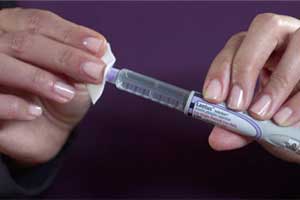- Home
- Editorial
- News
- Practice Guidelines
- Anesthesiology Guidelines
- Cancer Guidelines
- Cardiac Sciences Guidelines
- Critical Care Guidelines
- Dentistry Guidelines
- Dermatology Guidelines
- Diabetes and Endo Guidelines
- Diagnostics Guidelines
- ENT Guidelines
- Featured Practice Guidelines
- Gastroenterology Guidelines
- Geriatrics Guidelines
- Medicine Guidelines
- Nephrology Guidelines
- Neurosciences Guidelines
- Obs and Gynae Guidelines
- Ophthalmology Guidelines
- Orthopaedics Guidelines
- Paediatrics Guidelines
- Psychiatry Guidelines
- Pulmonology Guidelines
- Radiology Guidelines
- Surgery Guidelines
- Urology Guidelines
Insulin glargine 300 safe, effective in elders with Diabetes : SENIOR Trial

Safety and efficacy of insulin glargine 300 units/mL (Gla-300) in older adults with type 2 diabetes (T2D) is equivalent to that of Gla-100, with a similarly low or lower risk of symptomatic hypoglycemia, according to a study published in the journal Diabetes Care.
Robert Ritzel, Städtisches Klinikum München GmbH in Munich, Germany, conducted the study to compare the efficacy and safety of Gla-300 with Gla-100 in older people (≥65 years old) with type 2 diabetes.
Insulin glargine (Lantus) is a long-acting basal insulin analog which is given once daily to help control the blood sugar level of those with diabetes.
The open-label, two-arm, parallel-group, multicenter phase 3b SENIOR trial enrolled ∼20% of participants aged ≥75 years. A total of 1,014 participants were randomized 1:1 to Gla-300 or Gla-100, titrated to a fasting self-monitored plasma glucose of 5.0–7.2 mmol/L.
Read Also: Dulaglutide as effective as insulin glargine in diabetes with CKD: Lancet
Key Findings:
- From baseline to week 26, the reductions in HbA1c were comparable for Gla-300 and Gla-100 in the overall population and for participants aged ≥75 years
- Similar and low incidence and rates of confirmed or severe hypoglycemic events were reported between the groups, with lower rates of documented symptomatic hypoglycemia with Gla-300.
- Compared with the overall population, the subgroup aged ≥75 years had a more apparent lower risk of hypoglycemia with Gla-300 versus Gla-100.
- The annualized rates of documented symptomatic hypoglycemia were significantly lower with Gla-300 (Gla-300, 1.12 versus Gla-100, 2.71; rate ratio, 0.45).
Read Also: Oral insulin pill- the future of diabetes treatment is almost here
Based on the study, the authors concluded that efficacy and safety of Gla-300 were demonstrated in older people (≥65 years of age) with type 2 diabetes, with comparable reductions in HbA1c and similarly low or lower risk of documented symptomatic hypoglycemia versus Gla-100. A significant benefit of hypoglycemia reduction was seen in participants aged ≥75 years.
For further reference log on to https://doi.org/10.2337/dc18-0168

Disclaimer: This site is primarily intended for healthcare professionals. Any content/information on this website does not replace the advice of medical and/or health professionals and should not be construed as medical/diagnostic advice/endorsement or prescription. Use of this site is subject to our terms of use, privacy policy, advertisement policy. © 2020 Minerva Medical Treatment Pvt Ltd